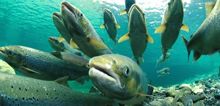2009 Press Releases
18.11.2009
The risk to wild Atlantic salmon populations of release of salmon bred in captivity would increase with global warming, according to a new study.
The Sunday Times (15/11/09) reports the details of a paper in the Proceedings of the Royal Society Series B (2009, 276, 3601-3610) involving researchers from the Department of Zoology, Ecology & Plant Science, UCC (ZEPS). This paper highlights the risk to wild Atlantic salmon populations, particularly at higher winter temperatures (as projected in climate change scenarios), of allowing hatchery-reared salmon to spawn in the wild http://www.timesonline.co.uk/tol/news/world/ireland/article6917448.ece.
The lead authors on this paper are Dr Philip McGinnity, Principal Investigator on the Beaufort Fish Population Genetics Programme in ZEPS, and Dr Eleanor Jennings of the Dundalk Institute of Technology, with co-authors including Professor Tom Cross, Scientific Co-ordinator on this Beaufort Programme, as well as researchers from TCD, the Marine Institute and the Rossby Centre (Swedish Meteorological and Hydrological Institute).
The Sunday Times article, written by Jan Battles, describes the major results of this study. Looking at a 37 year time series of freshwater survival of salmon from the Burrishoole System in Co Mayo, it was observed that survival was lower in years with higher winter temperatures. There is a hatchery on this system where a salmon strain, established from the wild native salmon population many generations ago, are reared for ranching. These reared fish occasionally escape into the wild where they can spawn amongst themselves and with their wild conspecifics. Survival was even more reduced in years where large numbers of captive-reared fish escaped into the wild. Thus, the combination of high winter temperatures and presence of large numbers of captive-bred sexually-mature fish led to poorer survival.
A survival model which incorporates projected future winter temperatures, indicates, that for the period 2069-2100, one would expect the wild population to survive relatively well. However, the introduction of captive-bred fish would lead to very low survival and possibly to extinction of the population. These results have obvious implications for stocking of captive-bred salmon or any other fish species into areas where wild populations co-exist.
1230MMcS

